Business Law Assignment: Exclusion Clauses in Contract Law (PACC6009)
VerifiedAdded on 2022/12/20
|11
|2866
|63
Homework Assignment
AI Summary
This business law assignment analyzes the concept of exclusion clauses within the framework of contract law, specifically addressing their enforceability and limitations. The assignment delves into the legal principles governing exclusion clauses, including incorporation, interpretation, and the impact of consumer protection laws, such as the Consumer Guarantee Act in Australia. It examines different types of exclusion clauses (true exclusion, limitation, and time limitation clauses), strict liability, and liability for negligence. The assignment applies these legal principles to a case scenario involving a faulty computer purchase, assessing the validity of an exclusion clause in light of unfair terms and implied guarantees. The analysis considers relevant case law and legal precedents, ultimately concluding on the enforceability of the exclusion clause and the liability of the business. The assignment highlights the balance between contractual freedom and consumer protection, emphasizing the importance of fair terms and implied guarantees in business transactions.
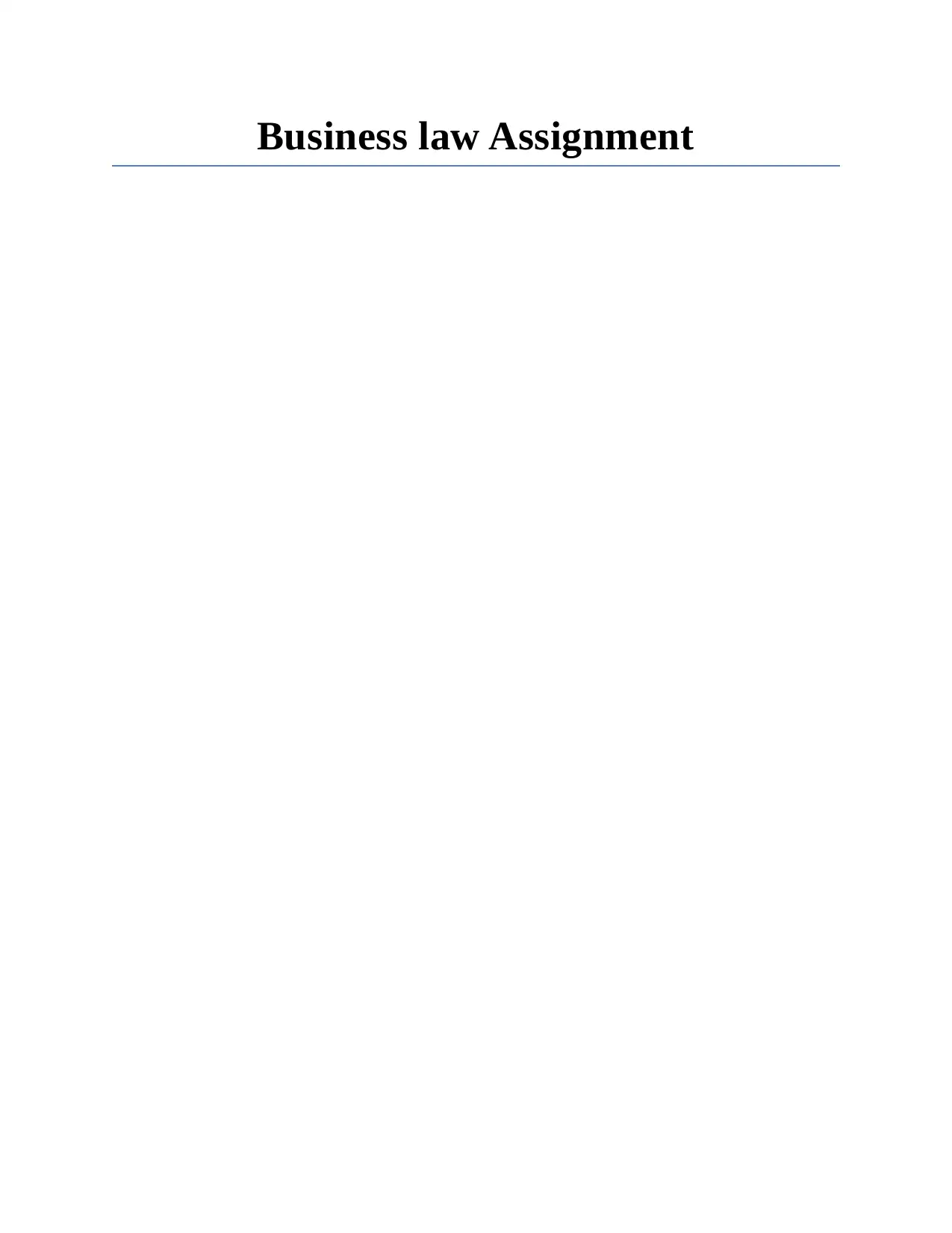
Business law Assignment
Paraphrase This Document
Need a fresh take? Get an instant paraphrase of this document with our AI Paraphraser
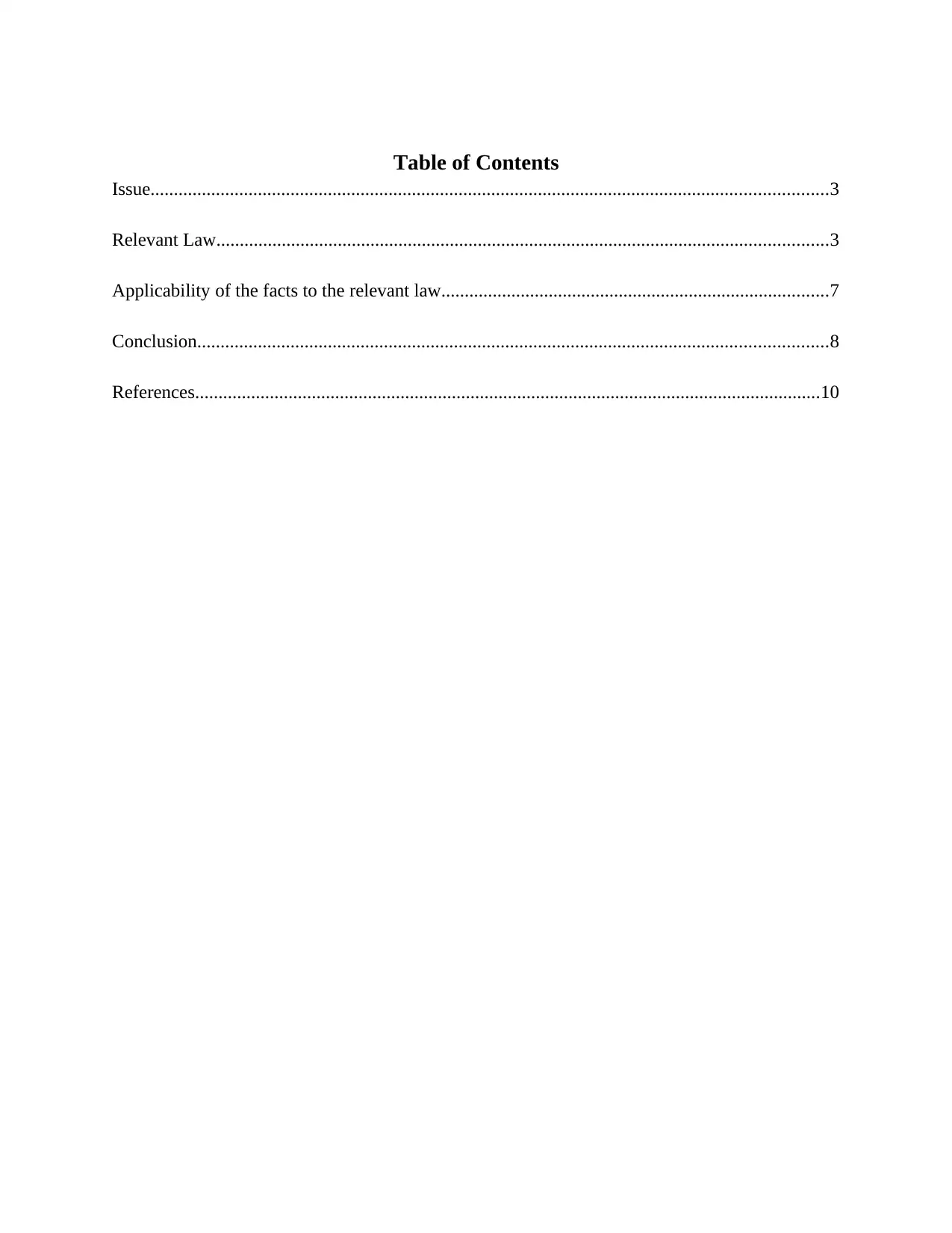
Table of Contents
Issue.................................................................................................................................................3
Relevant Law...................................................................................................................................3
Applicability of the facts to the relevant law...................................................................................7
Conclusion.......................................................................................................................................8
References......................................................................................................................................10
Issue.................................................................................................................................................3
Relevant Law...................................................................................................................................3
Applicability of the facts to the relevant law...................................................................................7
Conclusion.......................................................................................................................................8
References......................................................................................................................................10
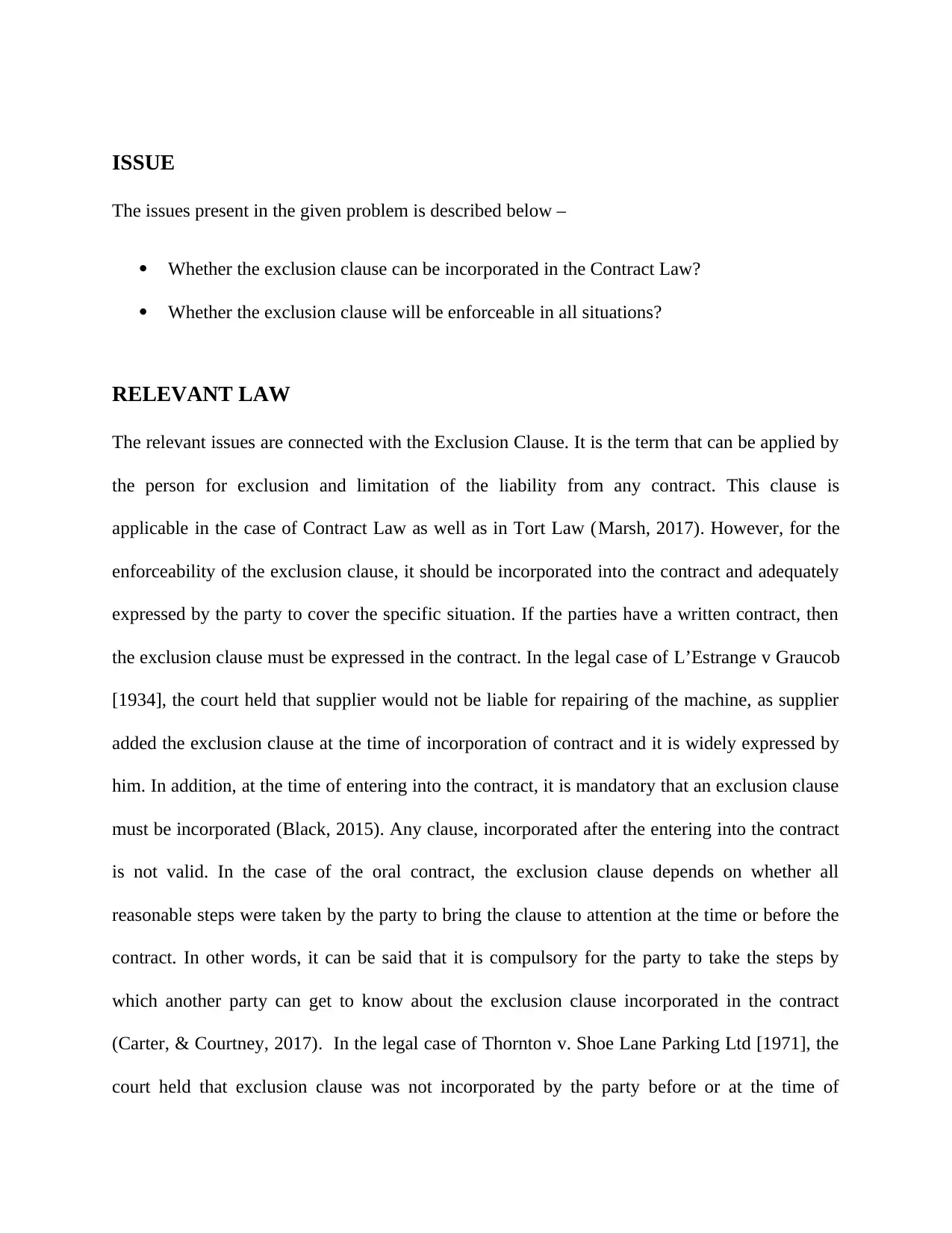
ISSUE
The issues present in the given problem is described below –
Whether the exclusion clause can be incorporated in the Contract Law?
Whether the exclusion clause will be enforceable in all situations?
RELEVANT LAW
The relevant issues are connected with the Exclusion Clause. It is the term that can be applied by
the person for exclusion and limitation of the liability from any contract. This clause is
applicable in the case of Contract Law as well as in Tort Law (Marsh, 2017). However, for the
enforceability of the exclusion clause, it should be incorporated into the contract and adequately
expressed by the party to cover the specific situation. If the parties have a written contract, then
the exclusion clause must be expressed in the contract. In the legal case of L’Estrange v Graucob
[1934], the court held that supplier would not be liable for repairing of the machine, as supplier
added the exclusion clause at the time of incorporation of contract and it is widely expressed by
him. In addition, at the time of entering into the contract, it is mandatory that an exclusion clause
must be incorporated (Black, 2015). Any clause, incorporated after the entering into the contract
is not valid. In the case of the oral contract, the exclusion clause depends on whether all
reasonable steps were taken by the party to bring the clause to attention at the time or before the
contract. In other words, it can be said that it is compulsory for the party to take the steps by
which another party can get to know about the exclusion clause incorporated in the contract
(Carter, & Courtney, 2017). In the legal case of Thornton v. Shoe Lane Parking Ltd [1971], the
court held that exclusion clause was not incorporated by the party before or at the time of
The issues present in the given problem is described below –
Whether the exclusion clause can be incorporated in the Contract Law?
Whether the exclusion clause will be enforceable in all situations?
RELEVANT LAW
The relevant issues are connected with the Exclusion Clause. It is the term that can be applied by
the person for exclusion and limitation of the liability from any contract. This clause is
applicable in the case of Contract Law as well as in Tort Law (Marsh, 2017). However, for the
enforceability of the exclusion clause, it should be incorporated into the contract and adequately
expressed by the party to cover the specific situation. If the parties have a written contract, then
the exclusion clause must be expressed in the contract. In the legal case of L’Estrange v Graucob
[1934], the court held that supplier would not be liable for repairing of the machine, as supplier
added the exclusion clause at the time of incorporation of contract and it is widely expressed by
him. In addition, at the time of entering into the contract, it is mandatory that an exclusion clause
must be incorporated (Black, 2015). Any clause, incorporated after the entering into the contract
is not valid. In the case of the oral contract, the exclusion clause depends on whether all
reasonable steps were taken by the party to bring the clause to attention at the time or before the
contract. In other words, it can be said that it is compulsory for the party to take the steps by
which another party can get to know about the exclusion clause incorporated in the contract
(Carter, & Courtney, 2017). In the legal case of Thornton v. Shoe Lane Parking Ltd [1971], the
court held that exclusion clause was not incorporated by the party before or at the time of
⊘ This is a preview!⊘
Do you want full access?
Subscribe today to unlock all pages.

Trusted by 1+ million students worldwide
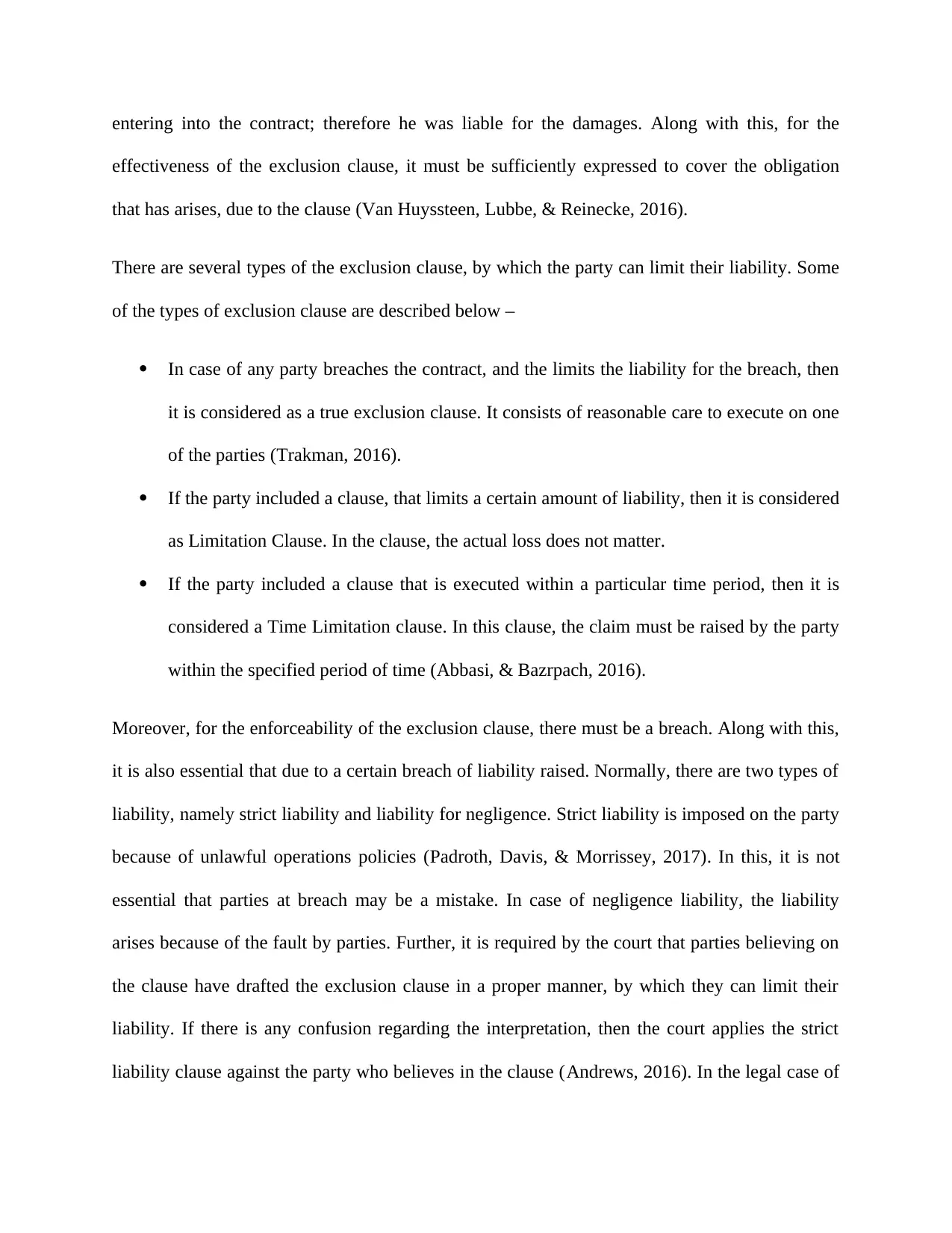
entering into the contract; therefore he was liable for the damages. Along with this, for the
effectiveness of the exclusion clause, it must be sufficiently expressed to cover the obligation
that has arises, due to the clause (Van Huyssteen, Lubbe, & Reinecke, 2016).
There are several types of the exclusion clause, by which the party can limit their liability. Some
of the types of exclusion clause are described below –
In case of any party breaches the contract, and the limits the liability for the breach, then
it is considered as a true exclusion clause. It consists of reasonable care to execute on one
of the parties (Trakman, 2016).
If the party included a clause, that limits a certain amount of liability, then it is considered
as Limitation Clause. In the clause, the actual loss does not matter.
If the party included a clause that is executed within a particular time period, then it is
considered a Time Limitation clause. In this clause, the claim must be raised by the party
within the specified period of time (Abbasi, & Bazrpach, 2016).
Moreover, for the enforceability of the exclusion clause, there must be a breach. Along with this,
it is also essential that due to a certain breach of liability raised. Normally, there are two types of
liability, namely strict liability and liability for negligence. Strict liability is imposed on the party
because of unlawful operations policies (Padroth, Davis, & Morrissey, 2017). In this, it is not
essential that parties at breach may be a mistake. In case of negligence liability, the liability
arises because of the fault by parties. Further, it is required by the court that parties believing on
the clause have drafted the exclusion clause in a proper manner, by which they can limit their
liability. If there is any confusion regarding the interpretation, then the court applies the strict
liability clause against the party who believes in the clause (Andrews, 2016). In the legal case of
effectiveness of the exclusion clause, it must be sufficiently expressed to cover the obligation
that has arises, due to the clause (Van Huyssteen, Lubbe, & Reinecke, 2016).
There are several types of the exclusion clause, by which the party can limit their liability. Some
of the types of exclusion clause are described below –
In case of any party breaches the contract, and the limits the liability for the breach, then
it is considered as a true exclusion clause. It consists of reasonable care to execute on one
of the parties (Trakman, 2016).
If the party included a clause, that limits a certain amount of liability, then it is considered
as Limitation Clause. In the clause, the actual loss does not matter.
If the party included a clause that is executed within a particular time period, then it is
considered a Time Limitation clause. In this clause, the claim must be raised by the party
within the specified period of time (Abbasi, & Bazrpach, 2016).
Moreover, for the enforceability of the exclusion clause, there must be a breach. Along with this,
it is also essential that due to a certain breach of liability raised. Normally, there are two types of
liability, namely strict liability and liability for negligence. Strict liability is imposed on the party
because of unlawful operations policies (Padroth, Davis, & Morrissey, 2017). In this, it is not
essential that parties at breach may be a mistake. In case of negligence liability, the liability
arises because of the fault by parties. Further, it is required by the court that parties believing on
the clause have drafted the exclusion clause in a proper manner, by which they can limit their
liability. If there is any confusion regarding the interpretation, then the court applies the strict
liability clause against the party who believes in the clause (Andrews, 2016). In the legal case of
Paraphrase This Document
Need a fresh take? Get an instant paraphrase of this document with our AI Paraphraser
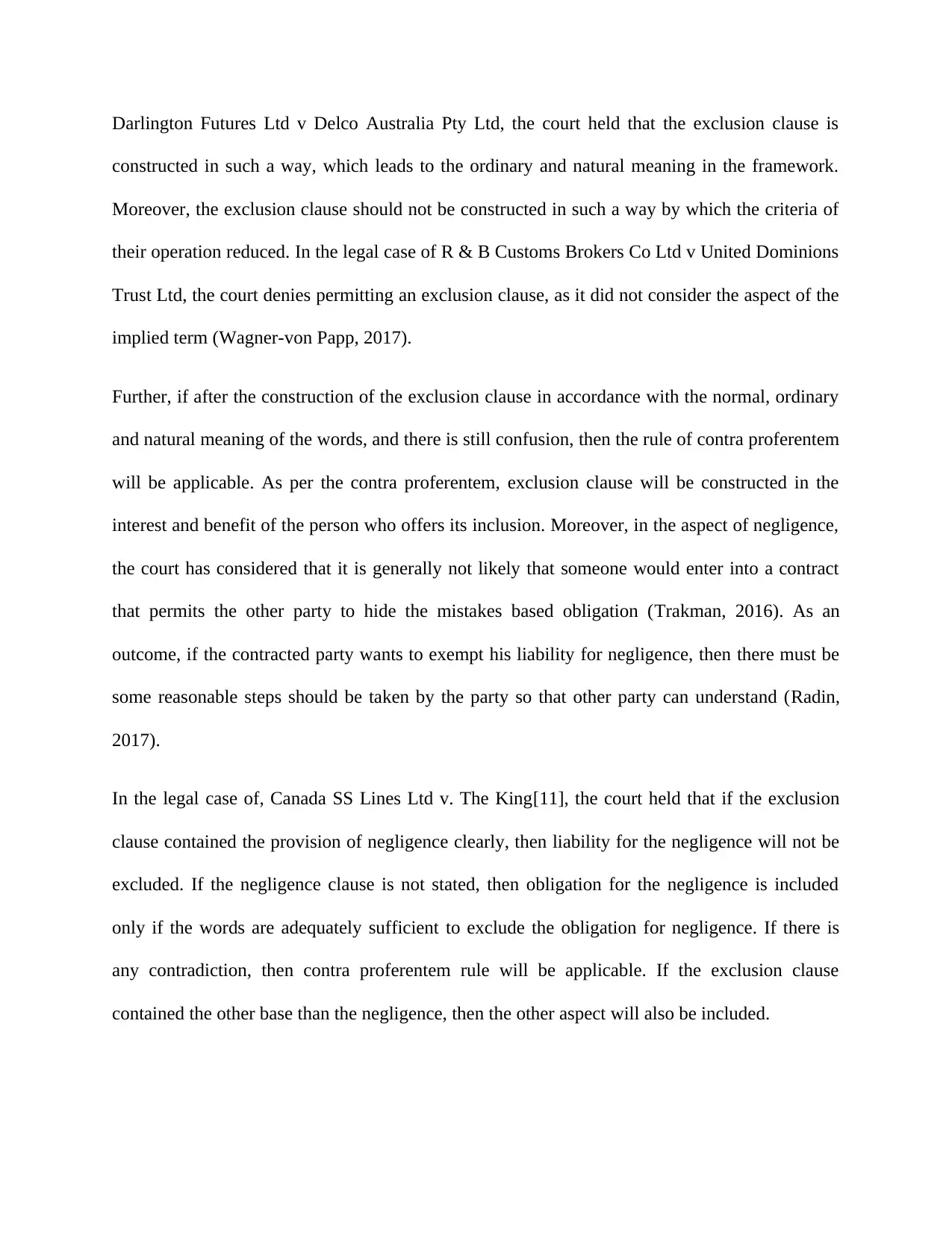
Darlington Futures Ltd v Delco Australia Pty Ltd, the court held that the exclusion clause is
constructed in such a way, which leads to the ordinary and natural meaning in the framework.
Moreover, the exclusion clause should not be constructed in such a way by which the criteria of
their operation reduced. In the legal case of R & B Customs Brokers Co Ltd v United Dominions
Trust Ltd, the court denies permitting an exclusion clause, as it did not consider the aspect of the
implied term (Wagner-von Papp, 2017).
Further, if after the construction of the exclusion clause in accordance with the normal, ordinary
and natural meaning of the words, and there is still confusion, then the rule of contra proferentem
will be applicable. As per the contra proferentem, exclusion clause will be constructed in the
interest and benefit of the person who offers its inclusion. Moreover, in the aspect of negligence,
the court has considered that it is generally not likely that someone would enter into a contract
that permits the other party to hide the mistakes based obligation (Trakman, 2016). As an
outcome, if the contracted party wants to exempt his liability for negligence, then there must be
some reasonable steps should be taken by the party so that other party can understand (Radin,
2017).
In the legal case of, Canada SS Lines Ltd v. The King[11], the court held that if the exclusion
clause contained the provision of negligence clearly, then liability for the negligence will not be
excluded. If the negligence clause is not stated, then obligation for the negligence is included
only if the words are adequately sufficient to exclude the obligation for negligence. If there is
any contradiction, then contra proferentem rule will be applicable. If the exclusion clause
contained the other base than the negligence, then the other aspect will also be included.
constructed in such a way, which leads to the ordinary and natural meaning in the framework.
Moreover, the exclusion clause should not be constructed in such a way by which the criteria of
their operation reduced. In the legal case of R & B Customs Brokers Co Ltd v United Dominions
Trust Ltd, the court denies permitting an exclusion clause, as it did not consider the aspect of the
implied term (Wagner-von Papp, 2017).
Further, if after the construction of the exclusion clause in accordance with the normal, ordinary
and natural meaning of the words, and there is still confusion, then the rule of contra proferentem
will be applicable. As per the contra proferentem, exclusion clause will be constructed in the
interest and benefit of the person who offers its inclusion. Moreover, in the aspect of negligence,
the court has considered that it is generally not likely that someone would enter into a contract
that permits the other party to hide the mistakes based obligation (Trakman, 2016). As an
outcome, if the contracted party wants to exempt his liability for negligence, then there must be
some reasonable steps should be taken by the party so that other party can understand (Radin,
2017).
In the legal case of, Canada SS Lines Ltd v. The King[11], the court held that if the exclusion
clause contained the provision of negligence clearly, then liability for the negligence will not be
excluded. If the negligence clause is not stated, then obligation for the negligence is included
only if the words are adequately sufficient to exclude the obligation for negligence. If there is
any contradiction, then contra proferentem rule will be applicable. If the exclusion clause
contained the other base than the negligence, then the other aspect will also be included.
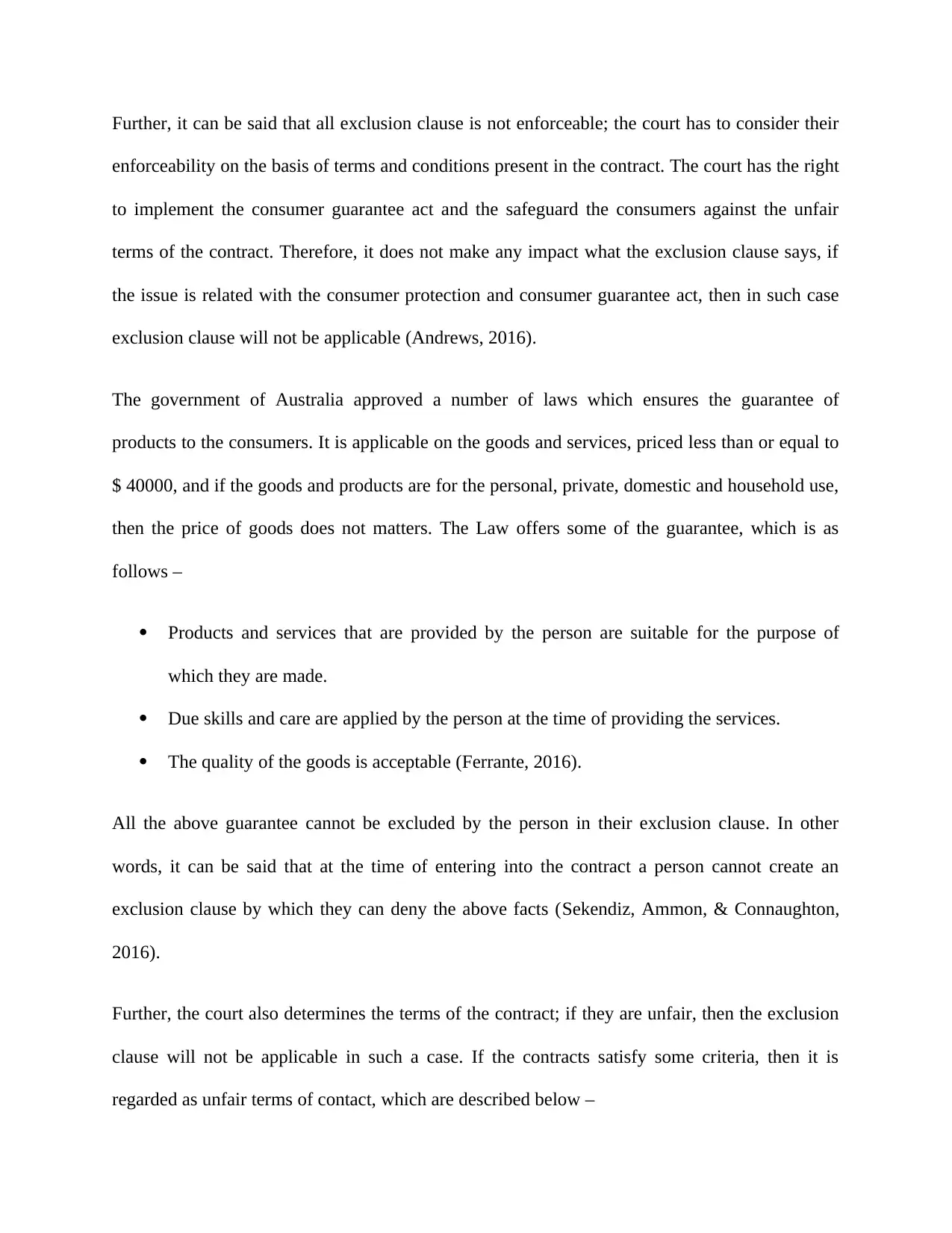
Further, it can be said that all exclusion clause is not enforceable; the court has to consider their
enforceability on the basis of terms and conditions present in the contract. The court has the right
to implement the consumer guarantee act and the safeguard the consumers against the unfair
terms of the contract. Therefore, it does not make any impact what the exclusion clause says, if
the issue is related with the consumer protection and consumer guarantee act, then in such case
exclusion clause will not be applicable (Andrews, 2016).
The government of Australia approved a number of laws which ensures the guarantee of
products to the consumers. It is applicable on the goods and services, priced less than or equal to
$ 40000, and if the goods and products are for the personal, private, domestic and household use,
then the price of goods does not matters. The Law offers some of the guarantee, which is as
follows –
Products and services that are provided by the person are suitable for the purpose of
which they are made.
Due skills and care are applied by the person at the time of providing the services.
The quality of the goods is acceptable (Ferrante, 2016).
All the above guarantee cannot be excluded by the person in their exclusion clause. In other
words, it can be said that at the time of entering into the contract a person cannot create an
exclusion clause by which they can deny the above facts (Sekendiz, Ammon, & Connaughton,
2016).
Further, the court also determines the terms of the contract; if they are unfair, then the exclusion
clause will not be applicable in such a case. If the contracts satisfy some criteria, then it is
regarded as unfair terms of contact, which are described below –
enforceability on the basis of terms and conditions present in the contract. The court has the right
to implement the consumer guarantee act and the safeguard the consumers against the unfair
terms of the contract. Therefore, it does not make any impact what the exclusion clause says, if
the issue is related with the consumer protection and consumer guarantee act, then in such case
exclusion clause will not be applicable (Andrews, 2016).
The government of Australia approved a number of laws which ensures the guarantee of
products to the consumers. It is applicable on the goods and services, priced less than or equal to
$ 40000, and if the goods and products are for the personal, private, domestic and household use,
then the price of goods does not matters. The Law offers some of the guarantee, which is as
follows –
Products and services that are provided by the person are suitable for the purpose of
which they are made.
Due skills and care are applied by the person at the time of providing the services.
The quality of the goods is acceptable (Ferrante, 2016).
All the above guarantee cannot be excluded by the person in their exclusion clause. In other
words, it can be said that at the time of entering into the contract a person cannot create an
exclusion clause by which they can deny the above facts (Sekendiz, Ammon, & Connaughton,
2016).
Further, the court also determines the terms of the contract; if they are unfair, then the exclusion
clause will not be applicable in such a case. If the contracts satisfy some criteria, then it is
regarded as unfair terms of contact, which are described below –
⊘ This is a preview!⊘
Do you want full access?
Subscribe today to unlock all pages.

Trusted by 1+ million students worldwide
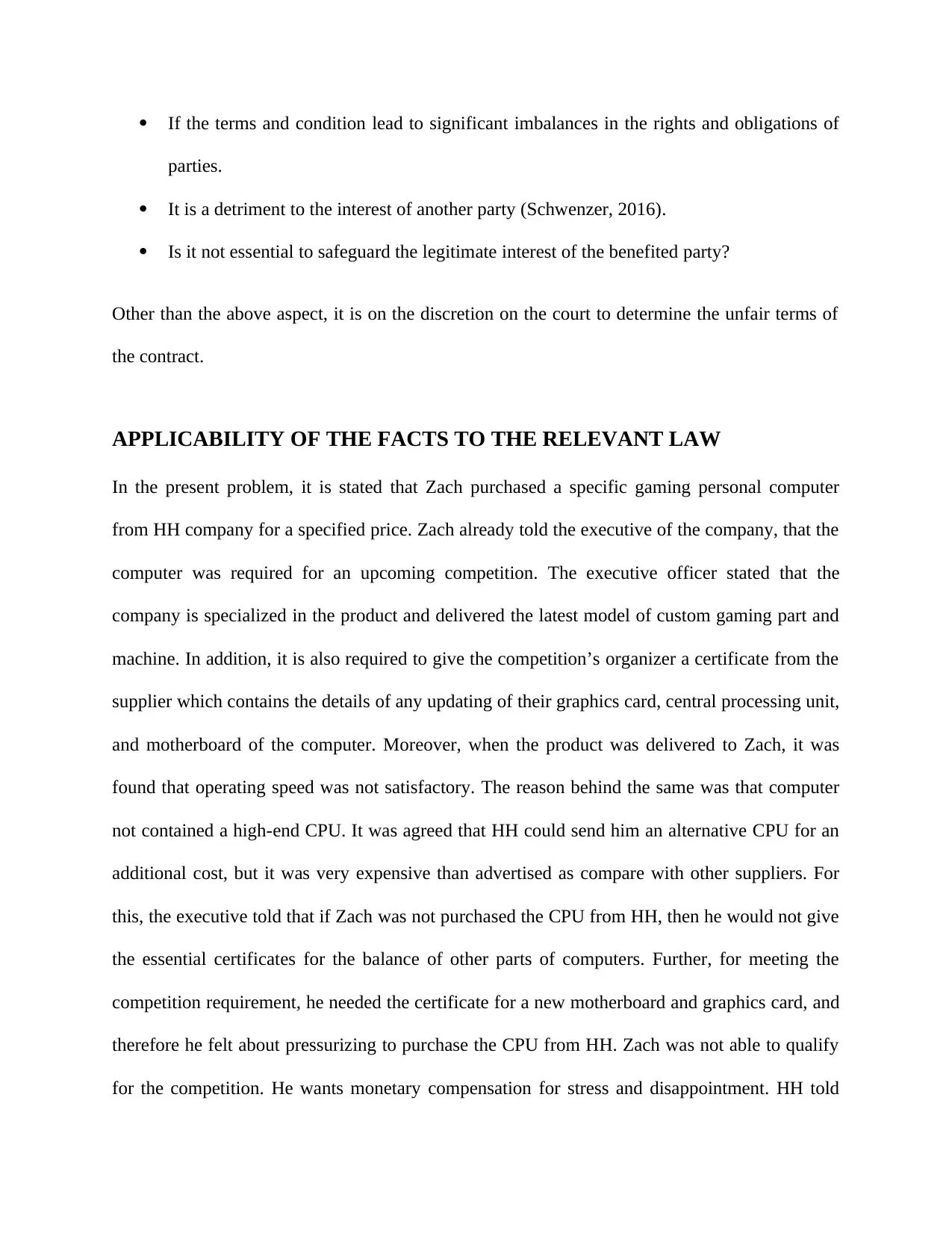
If the terms and condition lead to significant imbalances in the rights and obligations of
parties.
It is a detriment to the interest of another party (Schwenzer, 2016).
Is it not essential to safeguard the legitimate interest of the benefited party?
Other than the above aspect, it is on the discretion on the court to determine the unfair terms of
the contract.
APPLICABILITY OF THE FACTS TO THE RELEVANT LAW
In the present problem, it is stated that Zach purchased a specific gaming personal computer
from HH company for a specified price. Zach already told the executive of the company, that the
computer was required for an upcoming competition. The executive officer stated that the
company is specialized in the product and delivered the latest model of custom gaming part and
machine. In addition, it is also required to give the competition’s organizer a certificate from the
supplier which contains the details of any updating of their graphics card, central processing unit,
and motherboard of the computer. Moreover, when the product was delivered to Zach, it was
found that operating speed was not satisfactory. The reason behind the same was that computer
not contained a high-end CPU. It was agreed that HH could send him an alternative CPU for an
additional cost, but it was very expensive than advertised as compare with other suppliers. For
this, the executive told that if Zach was not purchased the CPU from HH, then he would not give
the essential certificates for the balance of other parts of computers. Further, for meeting the
competition requirement, he needed the certificate for a new motherboard and graphics card, and
therefore he felt about pressurizing to purchase the CPU from HH. Zach was not able to qualify
for the competition. He wants monetary compensation for stress and disappointment. HH told
parties.
It is a detriment to the interest of another party (Schwenzer, 2016).
Is it not essential to safeguard the legitimate interest of the benefited party?
Other than the above aspect, it is on the discretion on the court to determine the unfair terms of
the contract.
APPLICABILITY OF THE FACTS TO THE RELEVANT LAW
In the present problem, it is stated that Zach purchased a specific gaming personal computer
from HH company for a specified price. Zach already told the executive of the company, that the
computer was required for an upcoming competition. The executive officer stated that the
company is specialized in the product and delivered the latest model of custom gaming part and
machine. In addition, it is also required to give the competition’s organizer a certificate from the
supplier which contains the details of any updating of their graphics card, central processing unit,
and motherboard of the computer. Moreover, when the product was delivered to Zach, it was
found that operating speed was not satisfactory. The reason behind the same was that computer
not contained a high-end CPU. It was agreed that HH could send him an alternative CPU for an
additional cost, but it was very expensive than advertised as compare with other suppliers. For
this, the executive told that if Zach was not purchased the CPU from HH, then he would not give
the essential certificates for the balance of other parts of computers. Further, for meeting the
competition requirement, he needed the certificate for a new motherboard and graphics card, and
therefore he felt about pressurizing to purchase the CPU from HH. Zach was not able to qualify
for the competition. He wants monetary compensation for stress and disappointment. HH told
Paraphrase This Document
Need a fresh take? Get an instant paraphrase of this document with our AI Paraphraser
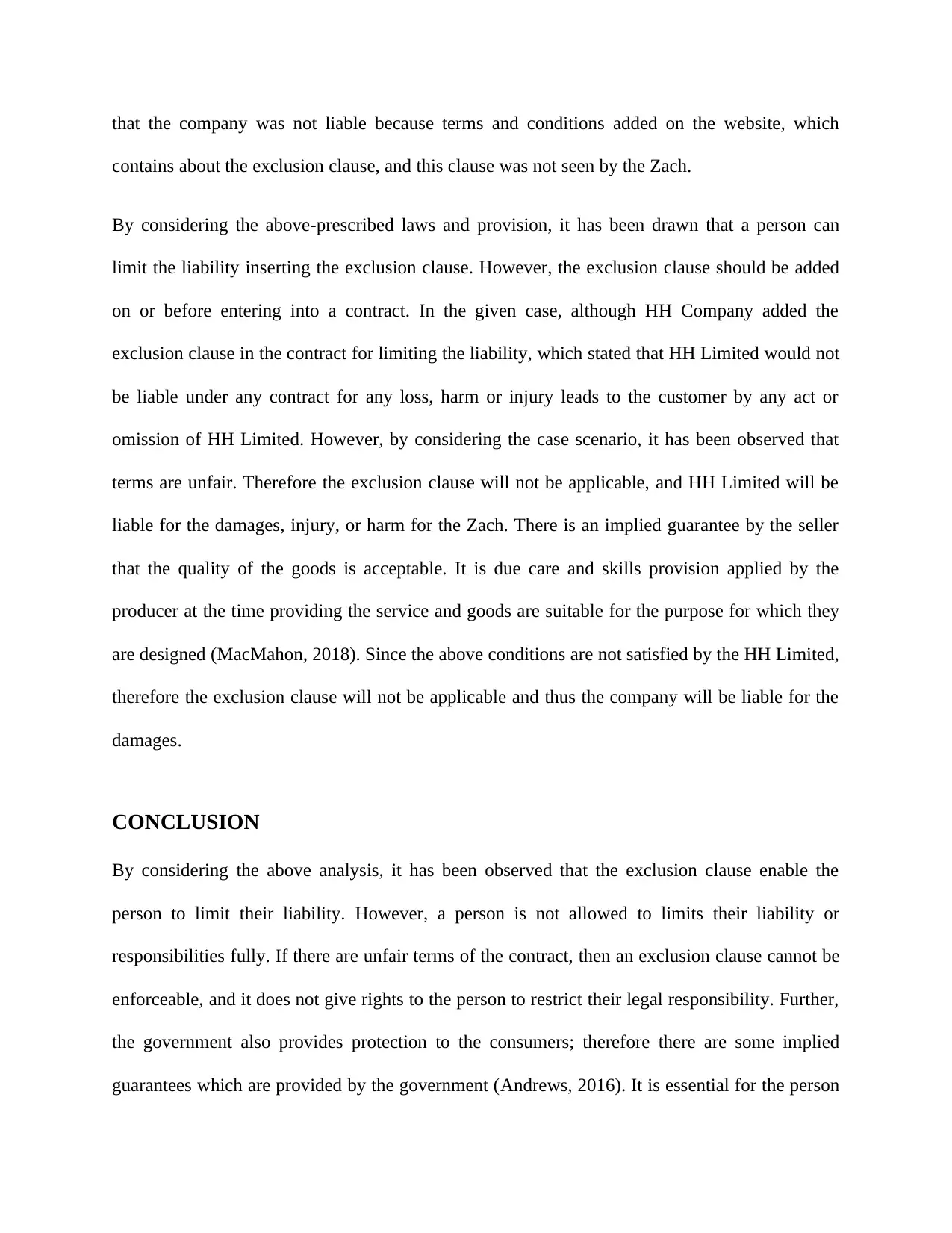
that the company was not liable because terms and conditions added on the website, which
contains about the exclusion clause, and this clause was not seen by the Zach.
By considering the above-prescribed laws and provision, it has been drawn that a person can
limit the liability inserting the exclusion clause. However, the exclusion clause should be added
on or before entering into a contract. In the given case, although HH Company added the
exclusion clause in the contract for limiting the liability, which stated that HH Limited would not
be liable under any contract for any loss, harm or injury leads to the customer by any act or
omission of HH Limited. However, by considering the case scenario, it has been observed that
terms are unfair. Therefore the exclusion clause will not be applicable, and HH Limited will be
liable for the damages, injury, or harm for the Zach. There is an implied guarantee by the seller
that the quality of the goods is acceptable. It is due care and skills provision applied by the
producer at the time providing the service and goods are suitable for the purpose for which they
are designed (MacMahon, 2018). Since the above conditions are not satisfied by the HH Limited,
therefore the exclusion clause will not be applicable and thus the company will be liable for the
damages.
CONCLUSION
By considering the above analysis, it has been observed that the exclusion clause enable the
person to limit their liability. However, a person is not allowed to limits their liability or
responsibilities fully. If there are unfair terms of the contract, then an exclusion clause cannot be
enforceable, and it does not give rights to the person to restrict their legal responsibility. Further,
the government also provides protection to the consumers; therefore there are some implied
guarantees which are provided by the government (Andrews, 2016). It is essential for the person
contains about the exclusion clause, and this clause was not seen by the Zach.
By considering the above-prescribed laws and provision, it has been drawn that a person can
limit the liability inserting the exclusion clause. However, the exclusion clause should be added
on or before entering into a contract. In the given case, although HH Company added the
exclusion clause in the contract for limiting the liability, which stated that HH Limited would not
be liable under any contract for any loss, harm or injury leads to the customer by any act or
omission of HH Limited. However, by considering the case scenario, it has been observed that
terms are unfair. Therefore the exclusion clause will not be applicable, and HH Limited will be
liable for the damages, injury, or harm for the Zach. There is an implied guarantee by the seller
that the quality of the goods is acceptable. It is due care and skills provision applied by the
producer at the time providing the service and goods are suitable for the purpose for which they
are designed (MacMahon, 2018). Since the above conditions are not satisfied by the HH Limited,
therefore the exclusion clause will not be applicable and thus the company will be liable for the
damages.
CONCLUSION
By considering the above analysis, it has been observed that the exclusion clause enable the
person to limit their liability. However, a person is not allowed to limits their liability or
responsibilities fully. If there are unfair terms of the contract, then an exclusion clause cannot be
enforceable, and it does not give rights to the person to restrict their legal responsibility. Further,
the government also provides protection to the consumers; therefore there are some implied
guarantees which are provided by the government (Andrews, 2016). It is essential for the person
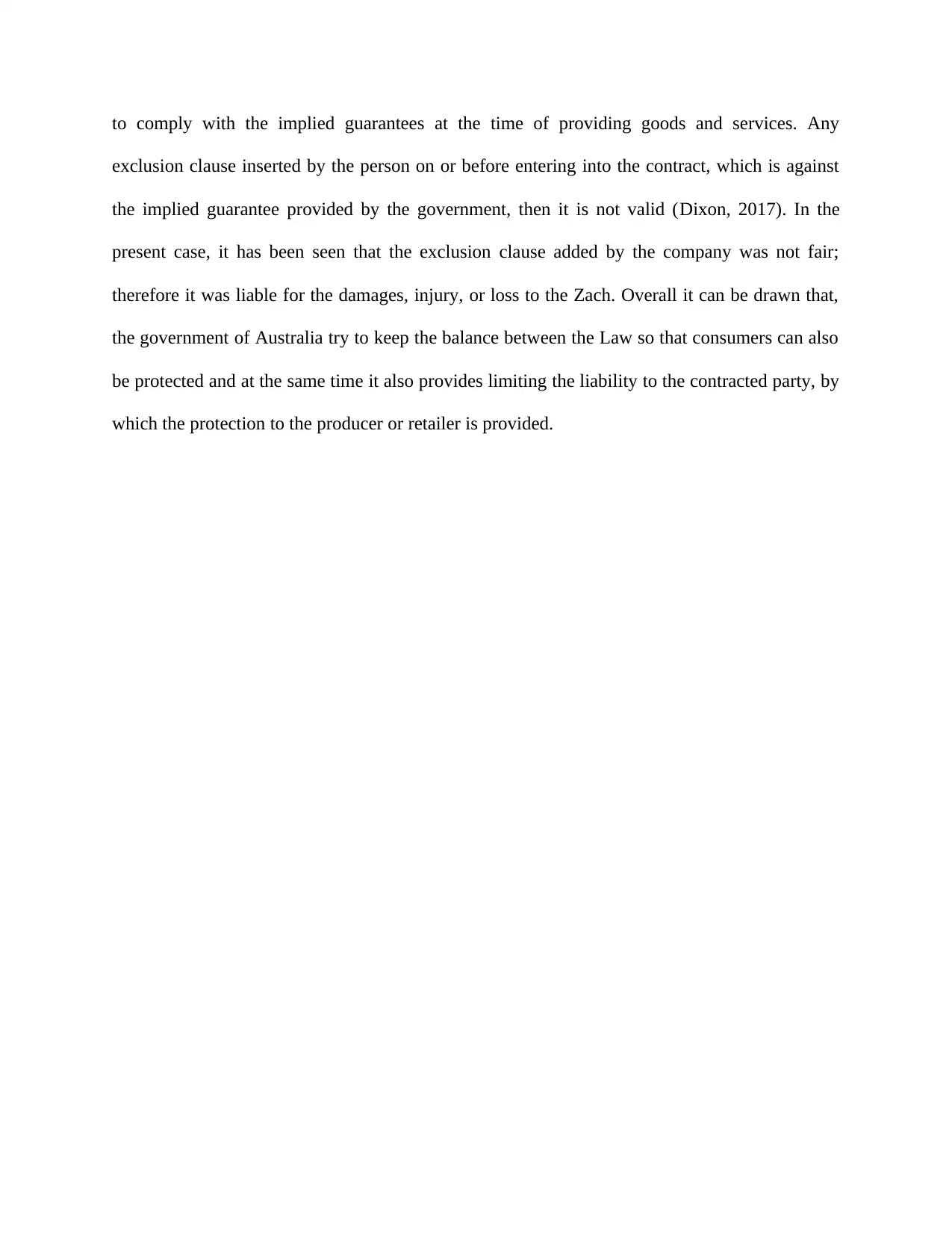
to comply with the implied guarantees at the time of providing goods and services. Any
exclusion clause inserted by the person on or before entering into the contract, which is against
the implied guarantee provided by the government, then it is not valid (Dixon, 2017). In the
present case, it has been seen that the exclusion clause added by the company was not fair;
therefore it was liable for the damages, injury, or loss to the Zach. Overall it can be drawn that,
the government of Australia try to keep the balance between the Law so that consumers can also
be protected and at the same time it also provides limiting the liability to the contracted party, by
which the protection to the producer or retailer is provided.
exclusion clause inserted by the person on or before entering into the contract, which is against
the implied guarantee provided by the government, then it is not valid (Dixon, 2017). In the
present case, it has been seen that the exclusion clause added by the company was not fair;
therefore it was liable for the damages, injury, or loss to the Zach. Overall it can be drawn that,
the government of Australia try to keep the balance between the Law so that consumers can also
be protected and at the same time it also provides limiting the liability to the contracted party, by
which the protection to the producer or retailer is provided.
⊘ This is a preview!⊘
Do you want full access?
Subscribe today to unlock all pages.

Trusted by 1+ million students worldwide
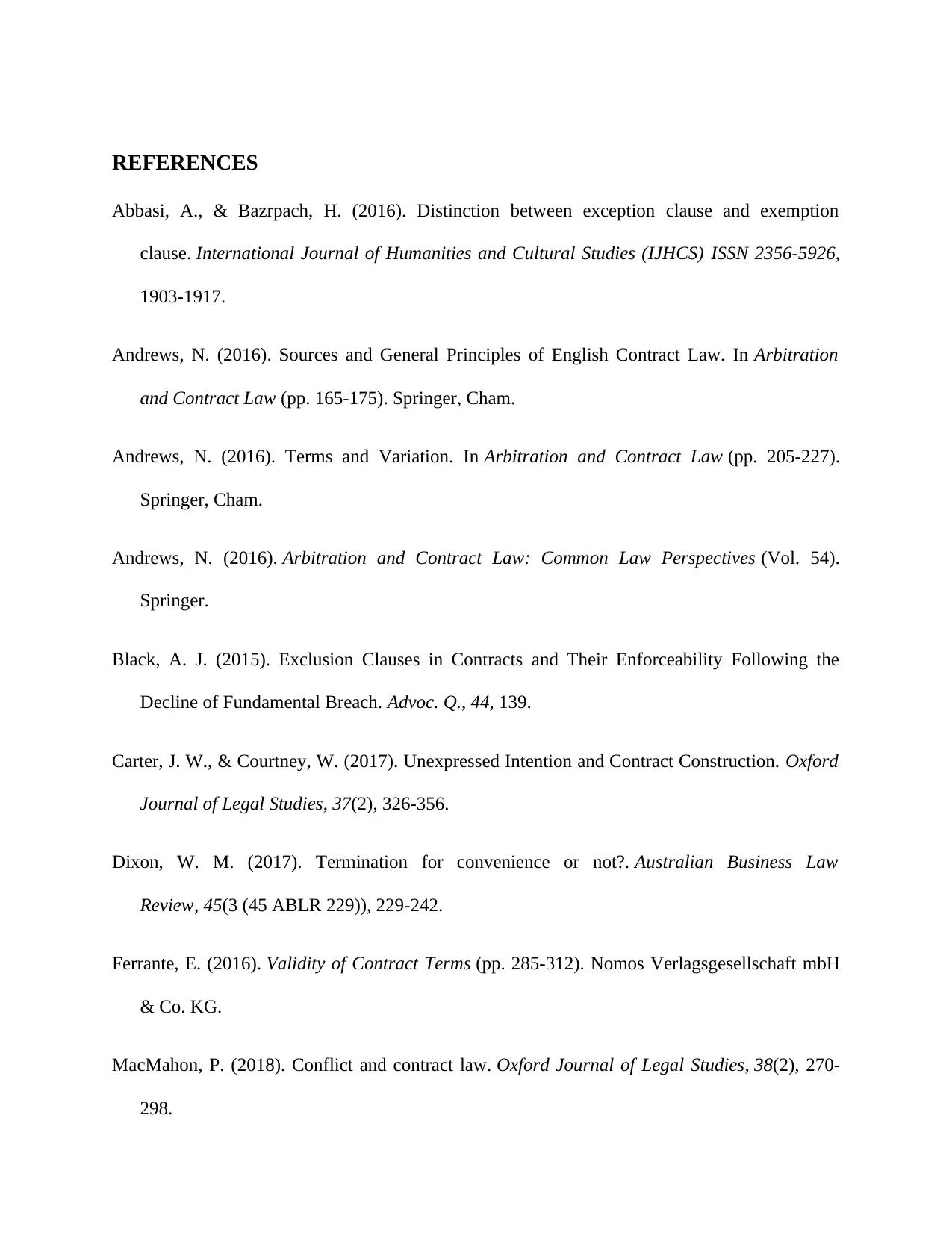
REFERENCES
Abbasi, A., & Bazrpach, H. (2016). Distinction between exception clause and exemption
clause. International Journal of Humanities and Cultural Studies (IJHCS) ISSN 2356-5926,
1903-1917.
Andrews, N. (2016). Sources and General Principles of English Contract Law. In Arbitration
and Contract Law (pp. 165-175). Springer, Cham.
Andrews, N. (2016). Terms and Variation. In Arbitration and Contract Law (pp. 205-227).
Springer, Cham.
Andrews, N. (2016). Arbitration and Contract Law: Common Law Perspectives (Vol. 54).
Springer.
Black, A. J. (2015). Exclusion Clauses in Contracts and Their Enforceability Following the
Decline of Fundamental Breach. Advoc. Q., 44, 139.
Carter, J. W., & Courtney, W. (2017). Unexpressed Intention and Contract Construction. Oxford
Journal of Legal Studies, 37(2), 326-356.
Dixon, W. M. (2017). Termination for convenience or not?. Australian Business Law
Review, 45(3 (45 ABLR 229)), 229-242.
Ferrante, E. (2016). Validity of Contract Terms (pp. 285-312). Nomos Verlagsgesellschaft mbH
& Co. KG.
MacMahon, P. (2018). Conflict and contract law. Oxford Journal of Legal Studies, 38(2), 270-
298.
Abbasi, A., & Bazrpach, H. (2016). Distinction between exception clause and exemption
clause. International Journal of Humanities and Cultural Studies (IJHCS) ISSN 2356-5926,
1903-1917.
Andrews, N. (2016). Sources and General Principles of English Contract Law. In Arbitration
and Contract Law (pp. 165-175). Springer, Cham.
Andrews, N. (2016). Terms and Variation. In Arbitration and Contract Law (pp. 205-227).
Springer, Cham.
Andrews, N. (2016). Arbitration and Contract Law: Common Law Perspectives (Vol. 54).
Springer.
Black, A. J. (2015). Exclusion Clauses in Contracts and Their Enforceability Following the
Decline of Fundamental Breach. Advoc. Q., 44, 139.
Carter, J. W., & Courtney, W. (2017). Unexpressed Intention and Contract Construction. Oxford
Journal of Legal Studies, 37(2), 326-356.
Dixon, W. M. (2017). Termination for convenience or not?. Australian Business Law
Review, 45(3 (45 ABLR 229)), 229-242.
Ferrante, E. (2016). Validity of Contract Terms (pp. 285-312). Nomos Verlagsgesellschaft mbH
& Co. KG.
MacMahon, P. (2018). Conflict and contract law. Oxford Journal of Legal Studies, 38(2), 270-
298.
Paraphrase This Document
Need a fresh take? Get an instant paraphrase of this document with our AI Paraphraser
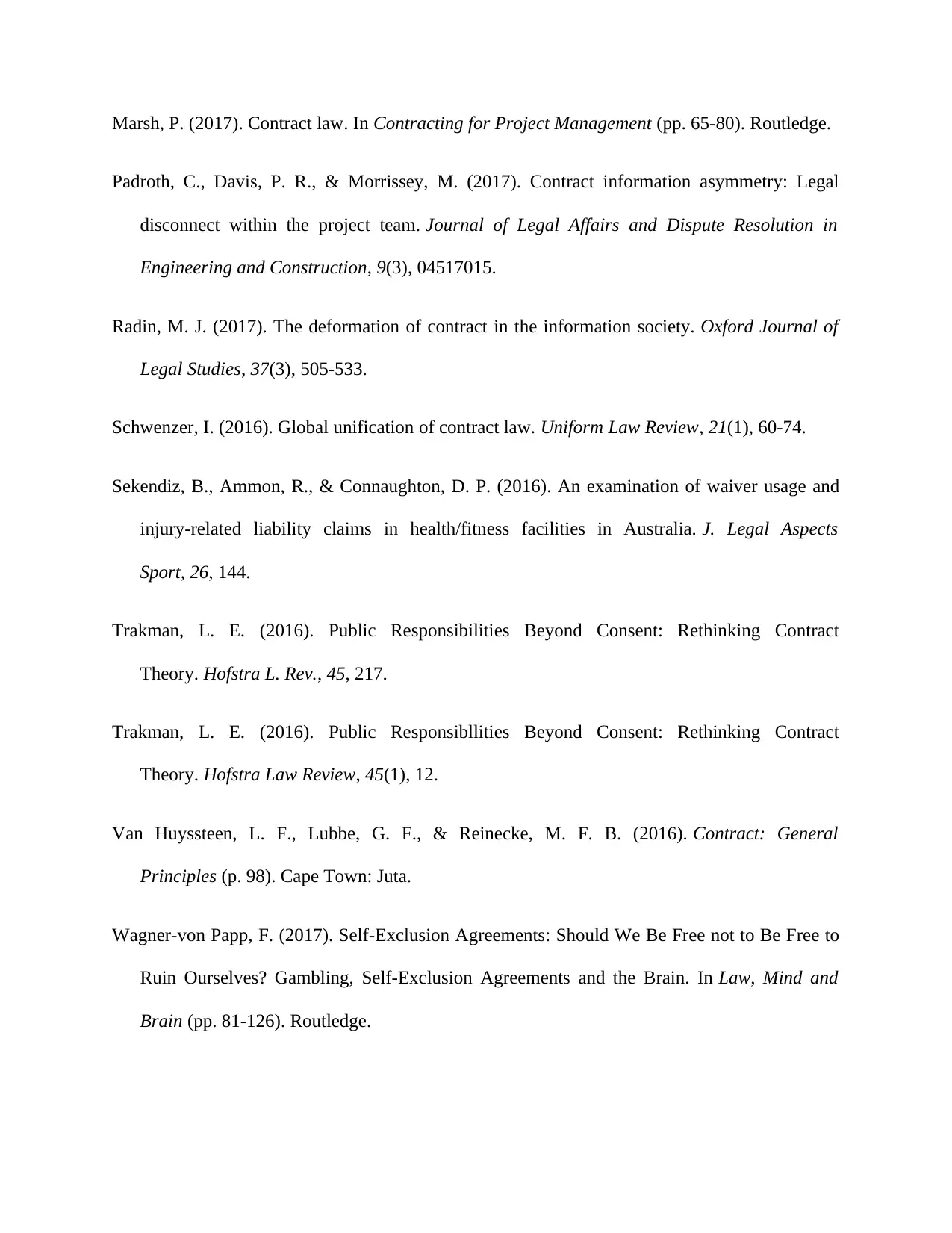
Marsh, P. (2017). Contract law. In Contracting for Project Management (pp. 65-80). Routledge.
Padroth, C., Davis, P. R., & Morrissey, M. (2017). Contract information asymmetry: Legal
disconnect within the project team. Journal of Legal Affairs and Dispute Resolution in
Engineering and Construction, 9(3), 04517015.
Radin, M. J. (2017). The deformation of contract in the information society. Oxford Journal of
Legal Studies, 37(3), 505-533.
Schwenzer, I. (2016). Global unification of contract law. Uniform Law Review, 21(1), 60-74.
Sekendiz, B., Ammon, R., & Connaughton, D. P. (2016). An examination of waiver usage and
injury-related liability claims in health/fitness facilities in Australia. J. Legal Aspects
Sport, 26, 144.
Trakman, L. E. (2016). Public Responsibilities Beyond Consent: Rethinking Contract
Theory. Hofstra L. Rev., 45, 217.
Trakman, L. E. (2016). Public Responsibllities Beyond Consent: Rethinking Contract
Theory. Hofstra Law Review, 45(1), 12.
Van Huyssteen, L. F., Lubbe, G. F., & Reinecke, M. F. B. (2016). Contract: General
Principles (p. 98). Cape Town: Juta.
Wagner-von Papp, F. (2017). Self-Exclusion Agreements: Should We Be Free not to Be Free to
Ruin Ourselves? Gambling, Self-Exclusion Agreements and the Brain. In Law, Mind and
Brain (pp. 81-126). Routledge.
Padroth, C., Davis, P. R., & Morrissey, M. (2017). Contract information asymmetry: Legal
disconnect within the project team. Journal of Legal Affairs and Dispute Resolution in
Engineering and Construction, 9(3), 04517015.
Radin, M. J. (2017). The deformation of contract in the information society. Oxford Journal of
Legal Studies, 37(3), 505-533.
Schwenzer, I. (2016). Global unification of contract law. Uniform Law Review, 21(1), 60-74.
Sekendiz, B., Ammon, R., & Connaughton, D. P. (2016). An examination of waiver usage and
injury-related liability claims in health/fitness facilities in Australia. J. Legal Aspects
Sport, 26, 144.
Trakman, L. E. (2016). Public Responsibilities Beyond Consent: Rethinking Contract
Theory. Hofstra L. Rev., 45, 217.
Trakman, L. E. (2016). Public Responsibllities Beyond Consent: Rethinking Contract
Theory. Hofstra Law Review, 45(1), 12.
Van Huyssteen, L. F., Lubbe, G. F., & Reinecke, M. F. B. (2016). Contract: General
Principles (p. 98). Cape Town: Juta.
Wagner-von Papp, F. (2017). Self-Exclusion Agreements: Should We Be Free not to Be Free to
Ruin Ourselves? Gambling, Self-Exclusion Agreements and the Brain. In Law, Mind and
Brain (pp. 81-126). Routledge.
1 out of 11
Related Documents
Your All-in-One AI-Powered Toolkit for Academic Success.
+13062052269
info@desklib.com
Available 24*7 on WhatsApp / Email
![[object Object]](/_next/static/media/star-bottom.7253800d.svg)
Unlock your academic potential
Copyright © 2020–2026 A2Z Services. All Rights Reserved. Developed and managed by ZUCOL.




